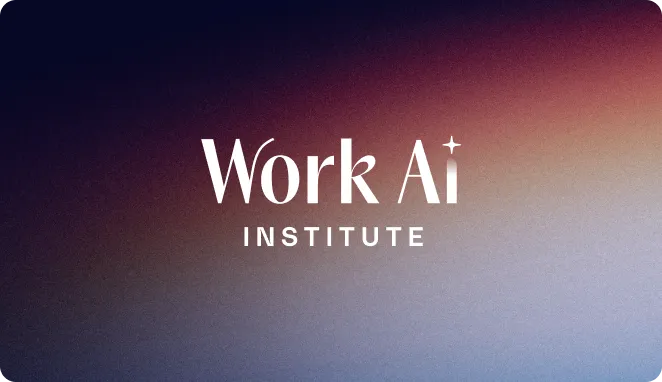- Intelligent search uses AI technology to understand user intent, providing results beyond simple keyword matches, and suggesting additional relevant materials based on the user's role and historical interactions.
- Intelligent search offers time efficiency, accuracy, personalized experience, and enhanced discoverability, making information retrieval more efficient and tailored to individual needs.
- Implementing intelligent search can lead to increased engagement, higher conversion rates, reduced customer support load, valuable data insights, and a competitive advantage in the digital landscape.
According to recent studies, the average knowledge worker spends about 20% of their workweek searching for internal information or dealing with data-related challenges. They need a better search platform that can help them efficiently navigate through the massive amount of information within their organization. This will ultimately lead to increased productivity.
What is intelligent search?
Intelligent search, driven by cutting-edge AI technology, transforms the traditional search experience by delving into the user's intent and generating results beyond simple keyword matches. It combines elements of semantic search and machine learning, crafting a comprehensive understanding of the user's overarching goal when initiating a search on a platform.
For instance, imagine an employee within a large organization searching for "project management guidelines." Intelligent search in an enterprise setting would not only provide the specific documents related to project management but also anticipate additional needs by suggesting relevant training materials, case studies, or related projects based on the user's role and historical interactions with the system. This nuanced understanding of user intent elevates the search experience, making information retrieval more efficient and tailored to individual needs.
User benefits of intelligent search
Time efficiency: Intelligent search expedites the user experience by swiftly delivering precise results, saving valuable time that might otherwise be spent sifting through irrelevant information.
Accuracy: Employing advanced algorithms ensures that search results align closely with user intent, significantly enhancing the accuracy of the search process.
Personalized experience: Through learning from past interactions, intelligent search tailors suggestions, creating a more engaging and user-friendly search personalization experience.
Enhanced discoverability: Users encounter a broader array of relevant content or products, enriching their interaction with the platform and exposing them to information they might not have found otherwise.

How does intelligent search work?
Intelligent search leverages Natural Language Processing (NLP), machine learning, and semantic search to better comprehend user goals. NLP and machine learning enable the prediction and tailoring of results for individual users. Semantic search, drawing insights from employees' information-seeking behavior, arranges documents and queries within a shared vector space. This approach is comparable to the systematic organization of resources in different departments and categories within an enterprise's digital intranet.
Here’s a few scenarios detailing the business benefits of intelligent search:
Increased engagement: By delivering more relevant results and suggestions, intelligent search boosts user interaction, leading to increased engagement rates on the platform.
Higher conversion rates: Aligning search results closely with user intent enhances the likelihood of users achieving desired actions, such as making a purchase or signing up, resulting in higher conversion rates.
Reduced customer support load: Empowering users to find information effortlessly reduces the volume of inquiries to customer support, enabling support teams to focus on more complex issues.
Data insights: Harvested data from user interactions provides valuable insights into user behavior and preferences, aiding better decision-making and strategy formulation.
Competitive advantage: In a digital landscape where user satisfaction differentiates businesses, implementing an intelligent intranet search system offers a substantial competitive edge.
Some business examples of intelligent search
1. Knowledge management system
A large corporation utilizes an intelligent search system for its internal knowledge base. Employees seeking information on a specific project can enter natural language queries, and the system, powered by machine learning and semantic search, not only retrieves relevant documents but also recommends related materials, fostering efficient knowledge sharing within the organization.
2. Customer support ticketing system
The customer support department within the organization implements intelligent search in its ticketing system. When customers submit queries, the system uses natural language processing to understand the issues and provides relevant resolutions from a knowledge base. This not only reduces the response time but also enables support agents to focus on more complex issues, improving overall customer satisfaction.
3. HR knowledge base
A company's human resources department employs intelligent search for its knowledge base. Employees seeking HR policies or information can enter queries, and the system, powered by machine learning, understands the intent, providing relevant documents along with additional resources such as training materials and FAQs, fostering a self-service HR environment.
4. E-commerce platform
An e-commerce platform employs intelligent search to understand customer preferences and behaviors. When a user searches for "running shoes," the system not only provides a list of products but also suggests related items based on the user's past purchases, enhancing the overall shopping experience and increasing the likelihood of cross-selling.
Conclusion
Intelligent intranet search is pivotal in creating more meaningful digital experiences. With many online resources, customers and internal employees face challenges finding what they seek. Additionally, they grapple with an influx of information, making quick access vital. Intelligent search solutions significantly enhance the ability of both customers and support agents to navigate through information by adding layers of understanding and intent.
Learn more about Glean, an intelligent enterprise search platform. It connects to 100+ business applications, so that employees can access what they need within a single search on the Glean platform. Schedule a demo now!









